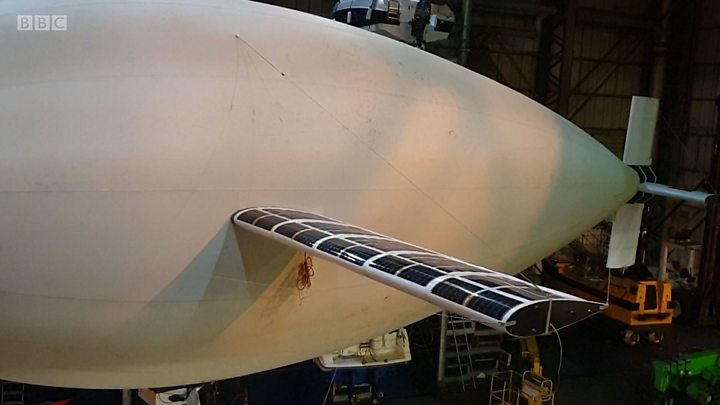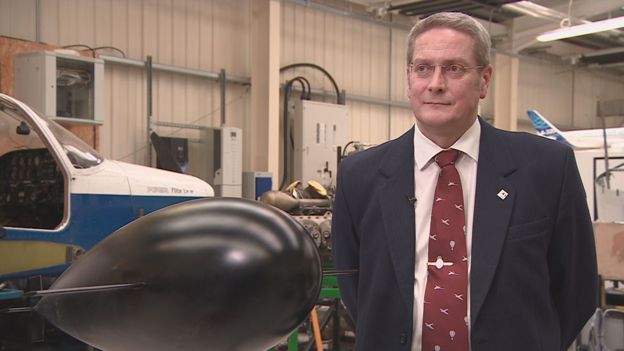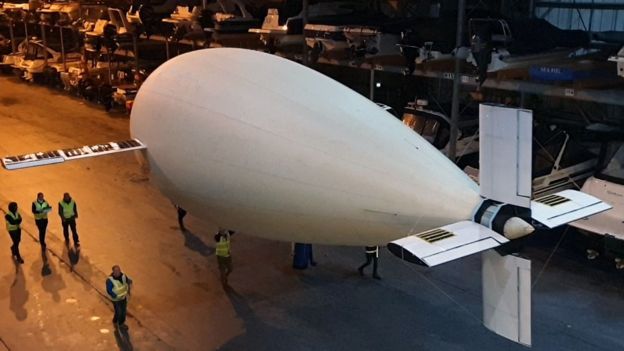By Kenneth Macdonald BBC Scotland special correspondent

Media playback is unsupported on your device
Future versions of Phoenix could be fitted with cameras and deployed in surveillance work
Exit player
Media captionFuture versions of Phoenix could be fitted with cameras and deployed in surveillance workResearchers from the University of the Highlands and Islands (UHI) have helped create a revolutionary new type of aircraft.
Phoenix is an unmanned aerial vehicle (UAV) designed to stay in the air indefinitely using a new type of propulsion.
Despite being 15m (50ft) long with a mass of 120kg (19 stone) she rises gracefully into the air.
She looks a little like an airship, except airships don't have wings.
"It's a proper aeroplane," says the UHI's Professor Andrew Rae.As the project's chief engineer, he has overseen the integration of Phoenix's systems.
"It flies under its own propulsion although it has no engines," he says.
"The central fuselage is filled with helium, which makes it buoyant so it can ascend like a balloon.
"And inside that there's another bag with compressors on it that brings air from outside, compresses the air, which makes the aeroplane heavier and then it descends like a glider."
Launch satellites
This ability to "breathe" - to switch quickly between being heavier or lighter than air - doesn't just make the plane go up and down.
It is the key to driving it forward. Phoenix is the first large-scale aircraft to be powered by variable-buoyancy propulsion.
It moves through the air like a porpoise through water.
That means it can travel long distances and stay aloft for long periods.
The point? To create a cheaper alternative to launching satellites.

Image caption Prof Andrew Rae says the Phoenix is a "proper aeroplane" The wings and tail carry solar panels so there is no need to carry fuel aloft.
The quasi-airship shape is based on an aerofoil, meaning it also provides lift like its wings do when the plane moves forward.
Prof Rae, using two wind tunnels at UHI's Perth College campus, led the design of its aerodynamics.
The technique of variable-buoyancy propulsion is already used underwater.
The Scottish Association for Marine Science (also part of UHI) has a small fleet of remotely operated vehicles - they call them gliders - that gather data in the North Atlantic.
They dive deep to collect data, then rise to the surface to transmit it via satellite.
But air is much less dense than water and this has made the principle a trickier proposition for flight.
Phoenix is the first aircraft of its size to use it.

Image caption The central fuselage of the Phoenix is filled with helium It is 15m (49ft) long with a wingspan of almost 11m (36ft)
Production versions would need to be scaled up to reach the altitudes of 20km required to fulfil its intended role.
An autonomous vehicle which is self-sufficient in energy could stay in the air for days, weeks, even months.
The technical term is "ultra-long endurance autonomous aircraft".
The team think it could revolutionise the telecommunications industry.
'Almost expendable'
The oft-quoted rule of thumb in the space business is that putting a satellite into orbit costs its weight in gold.
A Phoenix "pseudosatellite" could do the same job from high in the atmosphere at a fraction of the cost.
Prof Rae says some aircraft can already do this but are complex and expensive.
Phoenix, by contrast, is so cheap as to be "almost expendable".
In addition to UHI, the Phoenix project involves Bristol, Newcastle, Sheffield and Southampton universities.
It also involved four commercial companies and three of the UK's Technology Catapults, and has been part funded by the UK government's innovation agency Innovate UK.
Winter winds
The prototype Phoenix has been successfully tested inside the Drystack in Portsmouth, a huge indoor area which normally stores pleasure boats.
It was used to shelter the aircraft from the winter winds although production versions would operate in all weathers.
The project has involved its partners integrating the solar cells, flight control system, micropumps, carbon fibre wings and tail, reversible hydrogen fuel cell and rechargeable battery.
The last of these is what enables a solar-powered vehicle to keep working all night.
Now that the prototype has flown successfully, the consortium wants to collaborate with major manufacturers to take Phoenix to the next level.